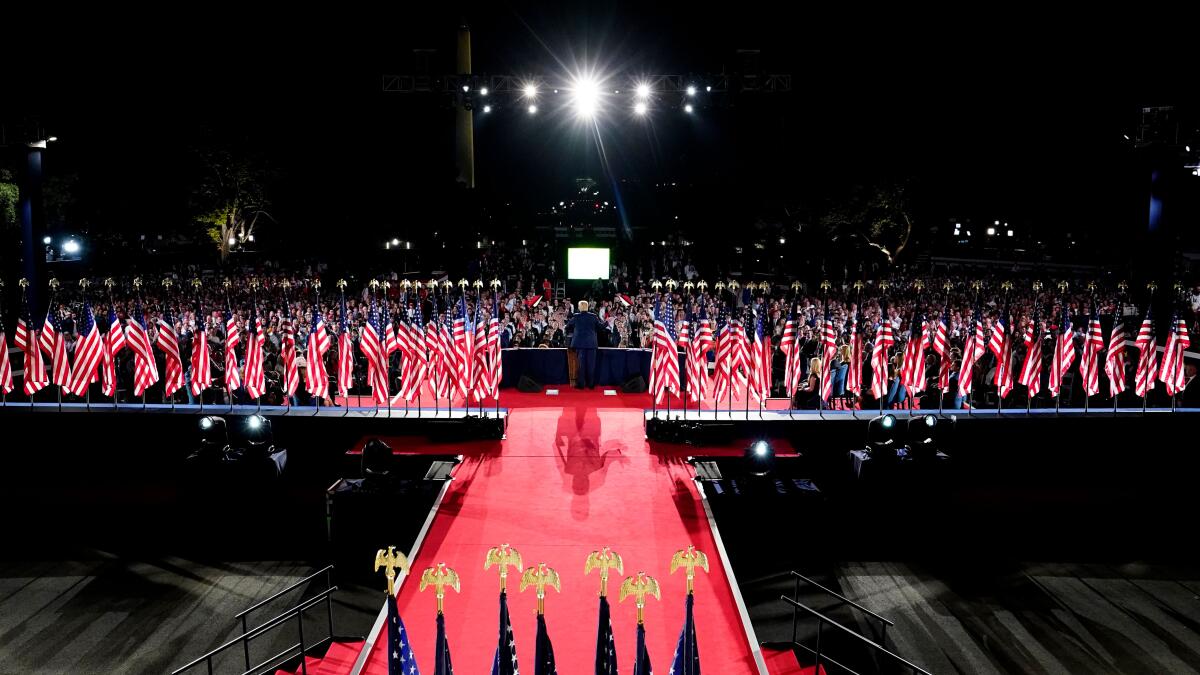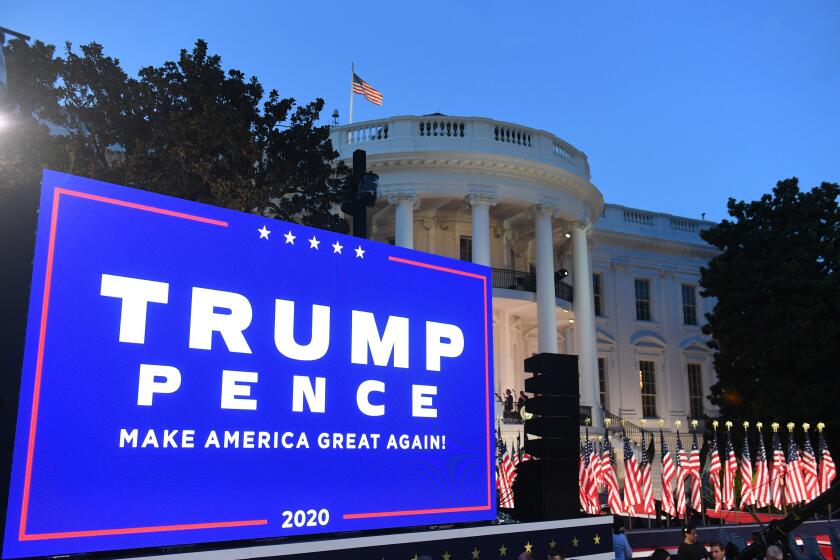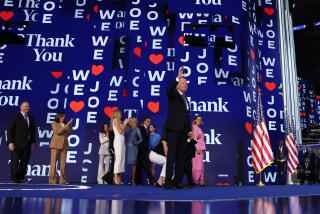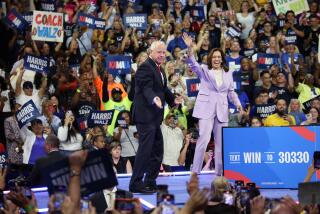Column: Conventions over, now comes the real battle

WASHINGTON â Most political conventions fade quickly from votersâ minds. In an era with few undecided voters, they donât produce big bounces in the polls the way they once did.
But the back-to-back conventions Americans just watched did perform one useful service: They set the terms of the debate that will dominate the final 65 days of the presidential campaign.
They clarified what political strategists and scholars call the âframingâ of the election â the principle that if a candidate can determine the main question voters focus on, he or she has a better chance of controlling the outcome.
Joe Biden is running for president based on the argument that President Trump has done a disastrous job on the most important problems facing the country: the COVID-19 pandemic, the struggling economy, racial injustice and our division into hostile camps.
Trump is trying to duck those issues, because Biden is right â they donât make the president look good.
Itâs almost impossible to argue with a straight face that Trumpâs response to the pandemic has been a triumph, although that hasnât stopped him from trying. The presidentâs campaign slogan might as well be âLetâs change the subject.â
His campaign, like his convention, focuses on the culture war themes he wielded against Hillary Clinton in 2016. He wants to frame the election around âlaw and order,â specifically his absurd and racially charged claim that Biden and the Democrats want to unleash âanarchistsâ on mostly white suburbs.
From Kimberly Guilfoyleâs loud speech to accusations of illegal politicking, here are notable moments from the 2020 Republican National Convention.
Which problem will voters focus on?
So far Biden appears to have the upper hand. Most voters say their top concerns are the deadly virus, the recession or the quality of national leadership, not urban unrest. In a Gallup poll this month, only 4% of voters cited âcrime and violenceâ as the most important problem facing the country.
That helps explain why Bidenâs advantage in national polls has remained relatively steady. Most voters donât seem to think protesters are about to invade their neighborhoods, no matter what Trump says.
Still, the president clearly believes law and order is his best issue.
âNo one will be safe in Bidenâs America,â he warned in his acceptance speech Thursday. (âThis happens to be Donald Trumpâs America,â Biden pointed out.)
The president is stoking fear both to energize his ardent supporters and to try to win back moderate voters who have drifted away since 2016.
âHe needs to get college-educated white women back,â Lynn Vavreck, a political science professor at UCLA, told me. âIf he can keep them from leaving, he can make the race close again.â
Thereâs no clear evidence that Trumpâs strategy is working yet. His standing in national polls has been even more stable than Bidenâs; in most surveys, heâs mired below 45%.
The immediate challenge for Trump is to persuade more voters to worry about unrest in places like Kenosha, Wis., where protests erupted after a police officer shot a Black man seven times in the back.
White House strategist Kellyanne Conway uttered an unpleasant truth last week: Street violence is good for the Trump campaignâs effort to frame the votersâ choice.
âThe more chaos and anarchy and vandalism and violence reigns, the better it is for the very clear choice on whoâs best on public safety and law and order,â she said on Fox News Channel. It doesnât mean the president wants the violence to continue, she added.
By the same token, the immediate challenge for Biden is to rebut Trumpâs charge that Democrats want to âgive free rein to violent anarchists, agitators and criminals.â
The Democratic nominee argued back in a flurry of television appearances during the Republican convention, but they were drowned out by the volume of GOP programming. He needs to get more clearly in front of the issue, perhaps by holding a news conference or making a quick trip to Wisconsin.
Still, street violence isnât the question Biden wants to focus on. He needs to frame the election around Trumpâs record on managing the pandemic and double-digit unemployment, personal and pocketbook issues that affect every American.
âHe should be asking: âAre you better off today than you were four years ago?ââ Vavreck said, quoting Ronald Reaganâs successful slogan against incumbent President Jimmy Carter in 1980.
Even questioning Trumpâs fitness for office, she added, is a potential distraction for Bidenâs campaign.
âThat didnât work very well for Hillary Clinton,â she noted.
In any case, the key to the election lies only partly in the arguments the two candidates make between now and Nov. 3. Voters already know who Biden and Trump are and what they stand for.
More important will be the unpredictable course of events between now and election day, how the candidates respond and how they affect votersâ perception of the choice â the electionâs framing, in other words.
Will the pandemic abate, allowing more parents to send their children to school (and making Trump look more successful), or will it rebound? Will the economy recover strongly or remain stuck at 10% unemployment?
And will street violence spread to become a bigger concern for the handful of voters who havenât made up their minds â especially in battleground states Trump needs to win, like Wisconsin?
Once you know the answers to those questions, you will have a clearer idea of how voters will frame their choice this fall â and that will allow you to predict the outcome. Until then, youâre only guessing.
More to Read
Get the L.A. Times Politics newsletter
Deeply reported insights into legislation, politics and policy from Sacramento, Washington and beyond. In your inbox three times per week.
You may occasionally receive promotional content from the Los Angeles Times.












